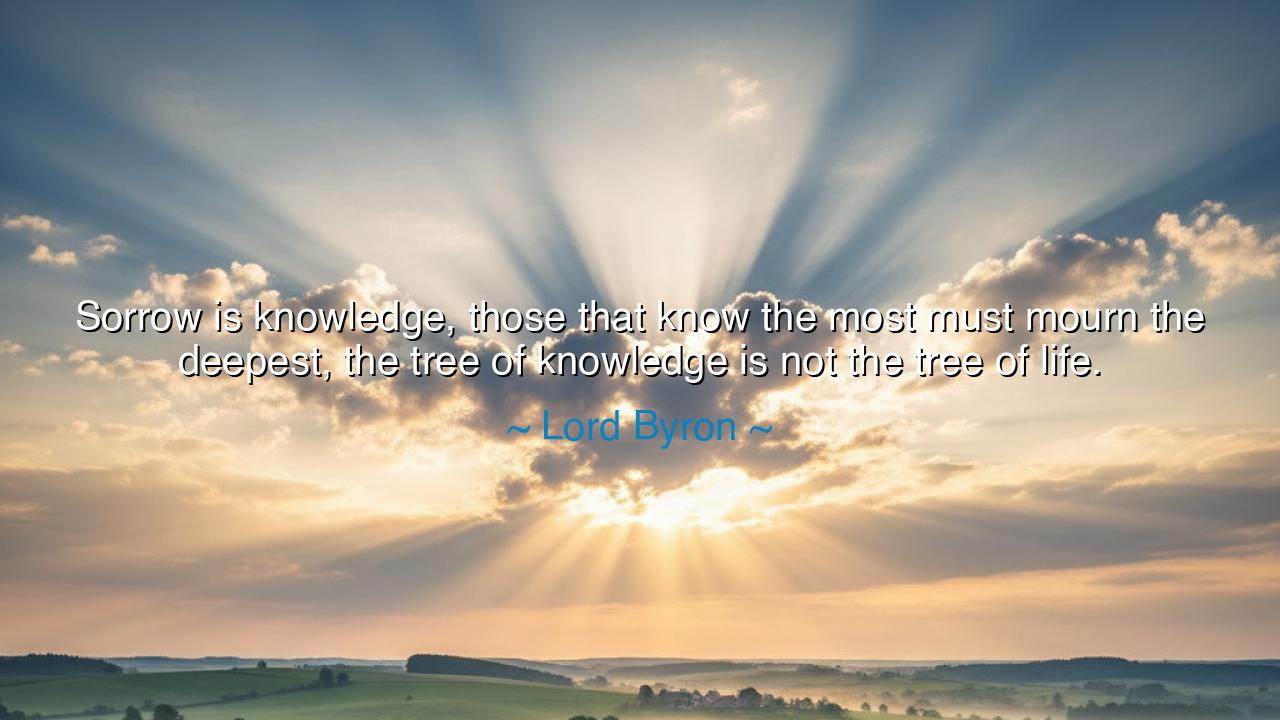
Sorrow is knowledge, those that know the most must mourn the
Sorrow is knowledge, those that know the most must mourn the deepest, the tree of knowledge is not the tree of life.






“Sorrow is knowledge, those that know the most must mourn the deepest, the tree of knowledge is not the tree of life.” — Lord Byron
In this haunting and immortal reflection, Lord Byron, the poet of fire and shadow, reveals one of the oldest and most sorrowful truths of humankind: that knowledge is not always a blessing, and that wisdom often carries with it the heavy burden of sorrow. His words echo through the ages like the voice of a prophet lamenting over the ruins of paradise. He reminds us that to know deeply is to feel deeply, and that with every layer of truth uncovered, one must also confront the pain that truth brings. For ignorance, though blind, is innocent; but knowledge, though illuminating, exposes us to the full measure of life’s tragedy — its impermanence, its cruelty, its beauty forever laced with loss.
The origin of Byron’s words lies in the same soil as the story of Eden, where the tree of knowledge bore both awakening and exile. When Adam and Eve tasted of that fruit, their eyes were opened — and in that moment, they saw good and evil, joy and grief, innocence and guilt. It was the birth of understanding, and with it, the death of untroubled happiness. Byron, steeped in classical learning and the melancholy of the Romantic age, understood this myth not as a tale of divine punishment, but as the human condition itself. Once awakened, the soul cannot return to its dream. Knowledge pulls us from the garden of simplicity and places us in the wilderness of truth, where we must bear the sorrow of seeing life as it is, not as we wish it to be.
The poet’s own life was proof of this principle. Byron was a man of vast intellect and deep passion, whose genius brought him insight into the hearts of men — and with that insight came despair. He saw hypocrisy in virtue, corruption in power, and mortality shadowing beauty. Like Prometheus, he carried the fire of understanding and suffered for it. His poetry, filled with longing and rebellion, reflects the agony of one who knows too much to rest content in illusion. To know, Byron believed, is to see the frailty of all things — to love and already mourn, to build and already foresee ruin, to live and already sense death.
History offers many mirrors to Byron’s truth. Socrates, the wisest of the ancients, said that wisdom begins with the recognition of one’s ignorance — a statement as sorrowful as it is profound. The more he understood, the more he perceived the limits of human knowing, and thus his wisdom was laced with humility and grief. Similarly, Leonardo da Vinci, that brilliant mind who sought to know the secrets of the earth and heavens, ended his life whispering that he had offended God and man because his work did not reach the perfection he envisioned. So it has always been: the greater the knowledge, the deeper the ache of imperfection. Those who see furthest into truth cannot help but weep for what they see.
Yet Byron’s final phrase — “the tree of knowledge is not the tree of life” — contains a second, gentler wisdom. It reminds us that while knowledge enlightens, it does not necessarily bring joy. The tree of life, in ancient symbolism, represents vitality, wholeness, and union with the divine. The tree of knowledge, by contrast, brings separation — the mind apart from the heart, the intellect from innocence. Byron thus cautions us: do not mistake knowing for living. To fill the mind is not to nourish the soul. One may be wise in reason and yet barren in spirit. Life is not sustained by facts, but by love, faith, and wonder — those elements that cannot be measured, but only felt.
The lesson, then, is not to flee from knowledge, but to approach it with humility and balance. Let the mind seek truth, but let the heart hold compassion. If knowledge reveals the suffering of the world, let it also inspire you to heal. If it unveils mortality, let it teach you to cherish the moment. For sorrow can be transformed into strength when it is met with understanding. The wise must mourn, yes — but they can also uplift, for their knowledge gives them the power to ease the burdens of others. The true sage is not one who hides from the pain of truth, but one who bears it with grace and turns it into light.
Therefore, my dear listener, take Byron’s words as both warning and invitation. Seek knowledge, but never forget to live. Learn deeply, but love more deeply still. Let your understanding make you tender, not proud; aware, but not despairing. The world will always hold mystery, loss, and sorrow — yet these, too, are teachers. When the weight of truth grows heavy, look toward the tree of life within you — the living heart that still beats with wonder, compassion, and faith.
And so, as Byron wrote in his melancholy majesty, “Sorrow is knowledge, those that know the most must mourn the deepest.” Accept this truth, but transcend it: let your mourning become meaning, and your knowledge become wisdom that gives life rather than takes it. For though the tree of knowledge may not be the tree of life, it is the hand of love — the divine spark within — that unites them both.






AAdministratorAdministrator
Welcome, honored guests. Please leave a comment, we will respond soon